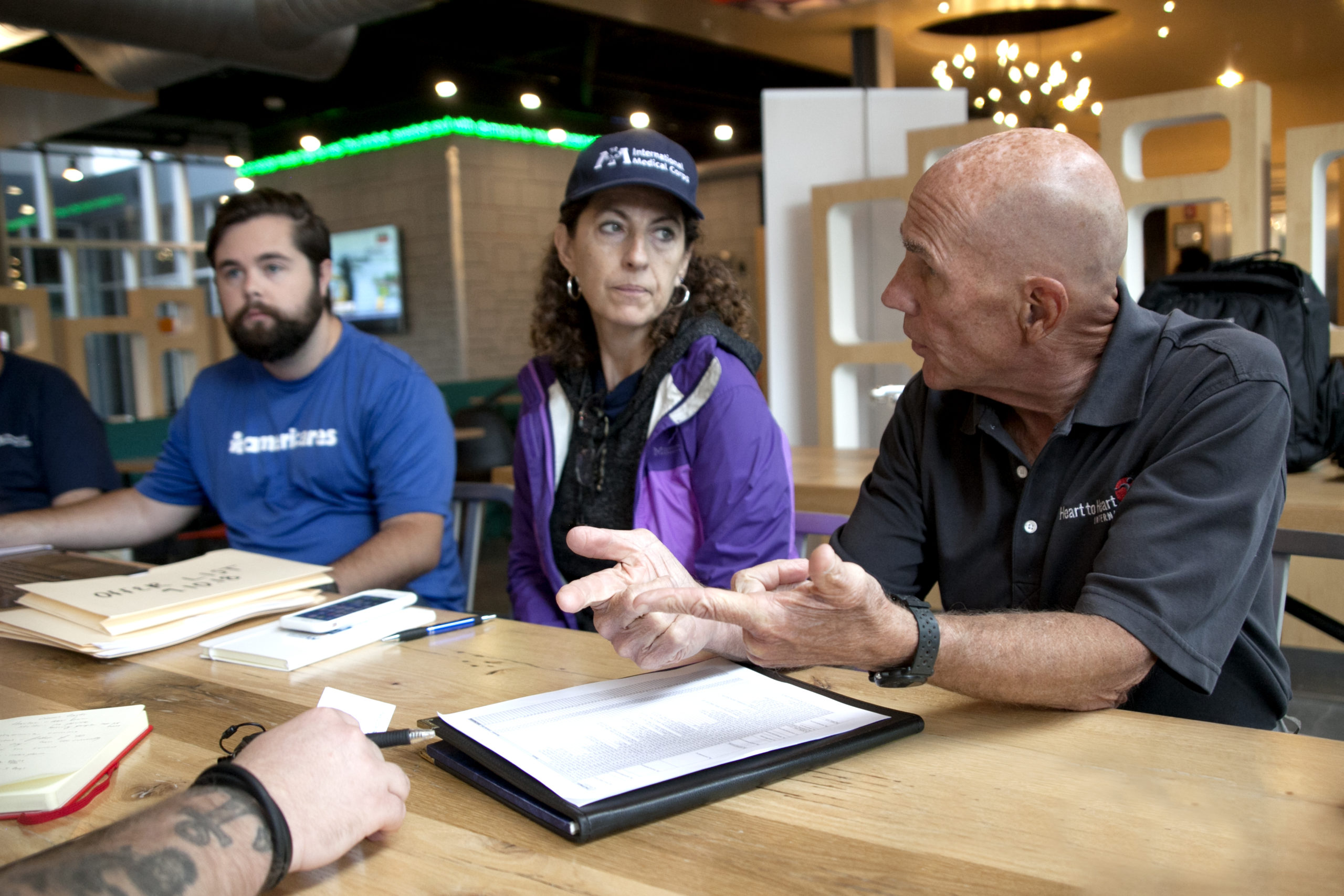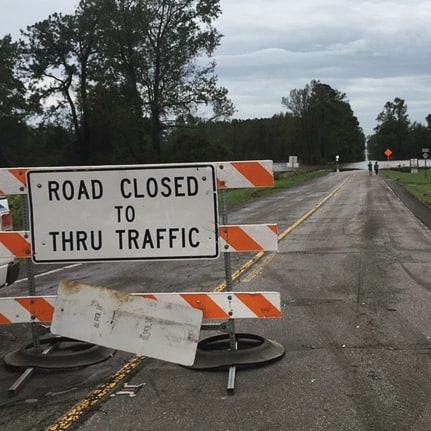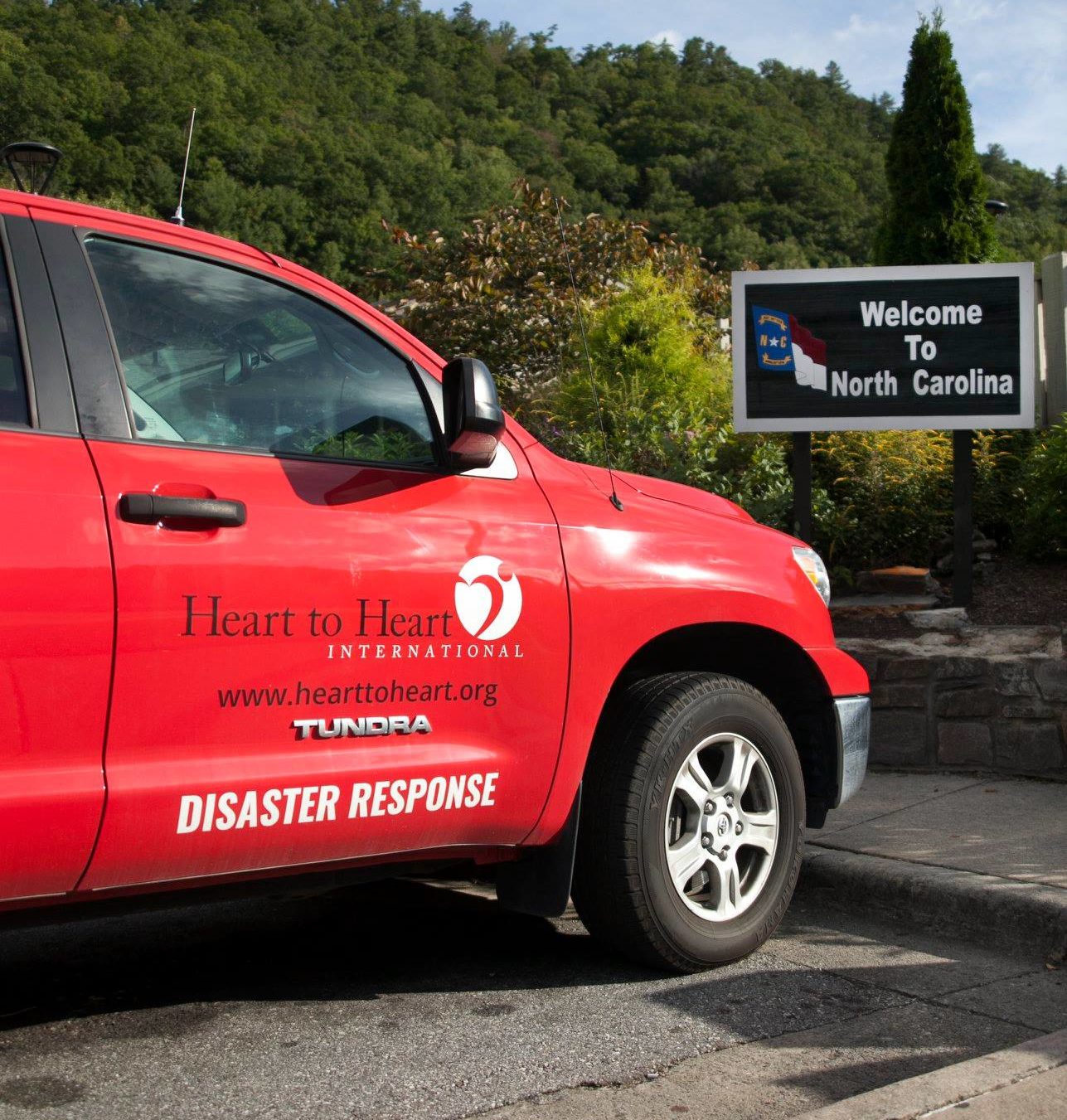Hurricane Florence was a powerful and long-lived hurricane that caused severe damage in the Carolinas in September 2018. Florence dropped as much as 35 inches of rain, caused extensive freshwater flooding, and killed 30 people total, with 21 of those in North Carolina.
HHI had an advance team on the ground before the hurricane came ashore and deployed medical teams and the mobile medical unit (MMU) to arrive soon after. While flooded roads remained a challenge throughout the length of the response, the teams were able to establish clinics with the MMU in Morehead City and Maxton, N.C., treated patients in shelters throughout Duplin County, performed tetanus vaccination clinics in the evenings for\ the Craven County Emergency Operations Center, and performed a tetanus vaccination clinic at a church in Jacksonville, N.C.
To ensure efficient and effective work, HHI coordinated with other NGOs on the ground in N.C., various county officials, state senator Danny Britt, Jr., and met with N.C. Governor Ray Cooper at one of the Duplin County shelters.
In addition to distributing hygiene kits to patients at our clinics, HHI also partnered with local churches and organizations which distributed kits in their own communities.
September 23 – HHI’s medical team performed a tetanus vaccination clinic at Abundant Life International Baptist Cathedral in Jacksonville, NC. The church was having a distribution event with supplies, including food and water, so it was a perfect chance to reach a lot of people. The team administered 59 tetanus vaccines at that event.
The people of North Carolina have been enormously welcoming of HHI and grateful for the availability of medical care. On Sept. 25, the MMU will move to and HHI will start working in Lumberton, N.C.
September 20, 2018 – Sometimes it’s easy to underestimate the power of water. But after more than 30 inches of rain fell and rivers crested beyond record-breaking flood stages during Hurricane Florence, unfortunately, some people discovered that power could be deadly.
Heart to Heart International has been in 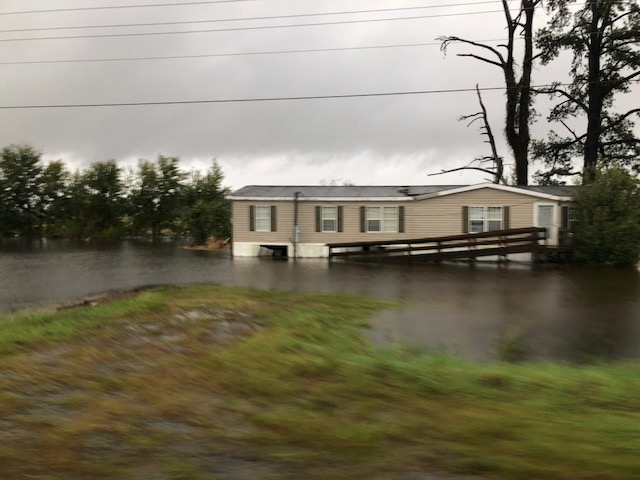
One woman the team treated was an 86-year-old woman who was not in great health. Her son was with her and told their story:
The woman and her two sons were in a car fleeing the storm when the flood waters began rising. Rapidly. The car ran into high water and before they could get away, the car was washed right off the road. The son grabbed his mother and pushed her out of the car. He found a branch and, with his mom in tow, grabbed on to it. For 40 minutes in the rain, rushing water and wind, he clung to that branch and to his mother. And as he did, he watched the water sweep away the car. With his brother still inside.
The son was afraid to tell his mother about his brother. She hadn’t seen the car get swept away. She didn’t know he had been killed. She kept asking for someone to check if he was in another shelter. But, the son who was with her wanted the HHI medical team to evaluate her condition before telling her the news. He was worried her health couldn’t handle the news of her son’s death after just losing her husband last year.
Together the HHI team and her son formulated a plan to evaluate her health at the shelter then coordinate with a grief counselor to admit her to a hospital before sharing the news of her other son’s death.
HHI can treat medical problems of those who survived Hurricane Florence, but the long-term anxiety and stress will not disappear when the flood waters recede. The son was grateful to the HHI team for connecting his mother with the resources they needed, but he admitted, “All I can think of, all I can dream of, is my brother going down in that car.”
Sometimes in the face of that, all we can do is listen. And care.
As of Thursday, September 20, at least 41 people have died in storm-related incidents. There were 811 road closures, and North Carolina is expected to remain in flood stages until Tuesday or Wednesday of next week.
HHI had a variety of operations today:
[youtube url=”//www.youtube.com/embed/wIJuBSxxpNU” size=”medium” align=”right”]
One team treated to shelters in Newport and one team worked out of the MMU in front of Cartaret County Health Care. HHI distributed 10-12 boxes of hygiene kits to a church distribution point in Newport. The following communities also each received 150 hygiene kits, distributed either by HHI or through Macedonia New Life Church:
- New Bern
- Jacksonville
- Fayetteville
- Wilmington
- Jacksonville
- Kenansville
- Newton Grove
- Goldsboro (Wayne County)
HHI medical teams have seen 227 patients and administered 41 tetanus vaccines. There continue to be many people struggling with upper respiratory issues as well as lack of access to regular medications and injuries sustained in the storm or in the clean-up process.
Patients are being referred to HHI to receive their tetanus vaccines, because as of now, HHI is the only healthcare provider in the area with tetanus vaccines.
More updates to follow
As of Wednesday, September 19, 2018, at least 36 people have died in storm-related incidents, and 13 river gauges are still at major flood stage. Approximately 7,800 people are staying in emergency shelters and nearly 200,000 people are without power. About 900 roads remain closed.
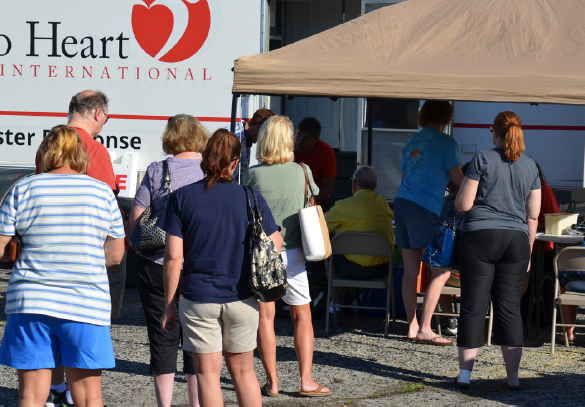
One doctor and three nurses worked at the MMU in front of Cartaret County Health Care. Word had gotten out that the MMU was there, and many people came to receive care. There were storm-related wounds, poison ivy and lots of respiratory issues caused by mold.
- One woman cut off part of her finger when trying to cut limbs up with her husband.
- One man had surgery two weeks ago to remove part of his colon. His trailer was condemned after the storm, so he has been living in his car with his wife and two teenage sons. All the medical offices are closed as are the pharmacies, so he had no way to get his medication. HHI was able to get him the medications he needed to continue his recovery.
- Another man has very high blood pressure and had been out of medication for three days. He didn’t want to go to the ER for something like that, but when he heard about the HHI clinic, he came by. The HHI doctor was able to get him his medication.
- Another man lived in an apartment and went out during what he thought was a lull in the storm. He was caught by the strong winds and thrown. He ended up with a concussion and lots of bruises that he came to the HHI clinic to have examined.
Another team went to Craven County in the afternoon/evening to provide a clinic for first responders.
Everyone the teams encountered were incredibly grateful to have them there. They were appreciative and kept asking if the MMU would be there tomorrow because they knew more people who needed the services. They were assured that it would be.
More updates to follow.
 As of Tuesday, September 18, 2018, at least 35 people have died in storm-related incidents, and 343,000 people are still without power in North Carolina. The Cape Fear River was expected to crest, and nearly 36 inches of rain has fallen over Elizabethtown, North Carolina.
As of Tuesday, September 18, 2018, at least 35 people have died in storm-related incidents, and 343,000 people are still without power in North Carolina. The Cape Fear River was expected to crest, and nearly 36 inches of rain has fallen over Elizabethtown, North Carolina.
The first medical team left New Bern early in the morning to reach two shelters in Duplin County that were most in need of medical care. The shelters had no power, running water or sewer services. They were crowded, hot and smelled. The team delivered desperately needed care to an all-ages population, many with pre-existing conditions worsened by the conditions. Many people lost their medicines for hyperglycemia or hypertension and were grateful to have medical services come to them, as travel was difficult. The stories of the people in the shelters were heartbreaking, including one 86-year-old woman who was in her car with her two sons when the flood waters rose and overtook their vehicle. Her son pushed her out of the car and pulled them both to a branch where he held on for 40 minutes. He kept her above water as he watched the water sweep away the car, his brother inside. “All I can think of, all I can dream of, is my brother going down in the car.”

1350 hygiene kits arrived at New Life Macedonia Church. Volunteers helped unload the truck and store the kits inside the church until final destinations are determined. Duplin County Social Services requested 1,000 kits, which will be delivered tomorrow morning to Raleigh.
More volunteer nurses, provider, and logistics arrived in Raleigh today. The team headed to New Bern in a truck packed with extra supplies to overnight with the rest of the HHI group.
 September 17, 2018 -The team divided and conquered today. One team went first to Wayne County EOC and then to various shelters throughout Duplin County. Kenansville, the center of Duplin County, has no power and is incredibly difficult to reach. Dr. George and Daniel met with the director of emergency services who said they had over 1200 people in 3 shelters throughout the county.
September 17, 2018 -The team divided and conquered today. One team went first to Wayne County EOC and then to various shelters throughout Duplin County. Kenansville, the center of Duplin County, has no power and is incredibly difficult to reach. Dr. George and Daniel met with the director of emergency services who said they had over 1200 people in 3 shelters throughout the county.
People were leaving today, but they are expecting that the shelters will fill back up when Wilmington is accessible again. The director indicated that because there is so much need, they would like medical providers at clinics at the shelters, though did not indicate a need for the MMU.
In Raleigh, Brian Sink will facilitate the delivery of the Sanofi-assembled hygiene kits to the Macedonia New Life church, though the pallets might have to be broken down in the parking lot, as the lot isn’t entirely accessible for FedEx delivery. Brian will also coordinate the arrival of four nurses and one provider to Raleigh tomorrow.
Another team, including team lead Wes Comfort, traveled to Carteret, County and visited with Dr. Victoria Selley who asked us to set up the MMU across the street from the only hospital in the county, Carteret Health Care in Morehead City. The whole town is out of power with no hotels or grocery stores open. The hospital has minimal self-generated power, but has been inundated with patients and wants the HHI medical team and MMU to help divert care and act as a triage system.
HQ and the team on the ground determined that because providers from IMC (International Medical Corps) had not yet established a place to work out of tomorrow, they would go to the shelters in Duplin County to provide care. The HHI providers and nurses will work out of the MMU in Morehead City tomorrow.
Hotels were booked solid if they were open at all, so finding a place to stay for the team tonight was difficult. Through various connections, the Wesleyan Church in New Bern offered for our team to stay in their church, which has power and air conditioning. New Bern is about a 45- minute drive from Morehead City. The team will head to Morehead City with the MMU early in the morning tomorrow and will be prepared to treat patients as they begin arriving.
 September 16, 2018 – Today has been a day of flexibility and changing plans, as is often the case in disaster response situations. The day started with the team prepared to head to Wilmington. State officials then declared that Wilmington is impossible to reach by land. It is completely cut off, with the only way to reach it by ocean. Alternate plans needed to be made.
September 16, 2018 – Today has been a day of flexibility and changing plans, as is often the case in disaster response situations. The day started with the team prepared to head to Wilmington. State officials then declared that Wilmington is impossible to reach by land. It is completely cut off, with the only way to reach it by ocean. Alternate plans needed to be made.
The team received word that they were requested at a shelter in New Bern, but after they began their trip with IMC (International Medical Corps), they got word back that they needed a final ok from government officials, which hadn’t come through yet.
The team then found out about a hospital in Bergaw, NC, that had been evacuated. Officials there requested assistance. The team tried to get to the town, but kept encountering road closures. The rain continued to fall and the creeks and rivers kept rising. More flooding was imminent and more roads would be closed. They could not find a way through. The team ultimately decided for their safety, they would travel back to Raleigh for the evening.
The team has been in contact with police, government officials and other aid organizations to find accessible routes or paths of entry to those areas devastated by the flooding. They will continue to work through the night to determine the best plan for tomorrow. An arrangement has been made with a church in Raleigh to accept a delivery of more hygiene kits, which will undoubtedly be invaluable as the flooding recedes and people are left to confront the damage caused to their homes by this storm.
 September 15, 2018 – The Mobile Medical Unit made it to Raleigh/Durham area late Friday night after traveling two days from Kansas City. The HHI advance team has been making connections and working with partners on the ground while the storm slowed its assault and dumped rain on already drenched areas. IMC (International Medical Corps) is one potential partner as is Convoy of Hope.
September 15, 2018 – The Mobile Medical Unit made it to Raleigh/Durham area late Friday night after traveling two days from Kansas City. The HHI advance team has been making connections and working with partners on the ground while the storm slowed its assault and dumped rain on already drenched areas. IMC (International Medical Corps) is one potential partner as is Convoy of Hope.
Neither of those groups had a solid plan as of Saturday afternoon. Flooding is still an issue. Teams spent Saturday morning meeting with IMC and Americares and calling government officials and shelter coordinators to find the areas most in need. It was determined there was a shelter near New Bern in a town called Havelock, NC, with 400 people in it without power while it was only designed for 200. The team split into two groups to attempt a northern and southern route from Raleigh/Durham to Havelock. The roads are deserted. There is standing water in yards and roads, power outages, and no signs of life starting back up yet. When the team got just outside Kinston, the highway and side roads were closed due to flooding from a nearby creek. With rain continuing to fall, more flooding is imminent. Teams returned to Raleigh/Durham.
Our Disaster Response Team has been in contact with police and government officials who have confirmed there is a need for medical help. Will continue to reach out overnight for other ways to get Mobile Medical Unit and/or medical team to those in need along the coast, including the possibility of resourcing military or highway patrol. Also investigating feasibility and need of providing help to those sheltered in Raleigh/Durham areas and finding where we can deliver pallets of hygiene kits to then distribute. Tomorrow the plan is to head to Williamsburg, as it is one of the hardest-hit areas.
September 14, 2018 – Heart to Heart International team lead Wes Comfort updating us on the situation in North Carolina. Thanks to support from the AbbVie Foundation, the Mobile Medical Unit (MMU) will arrive in NC later tonight. Teams will then head to areas most affected by Hurricane Florence.
[youtube url=”//www.youtube.com/embed/ewXCgKq5hEc” size=”large” align=”right”]


